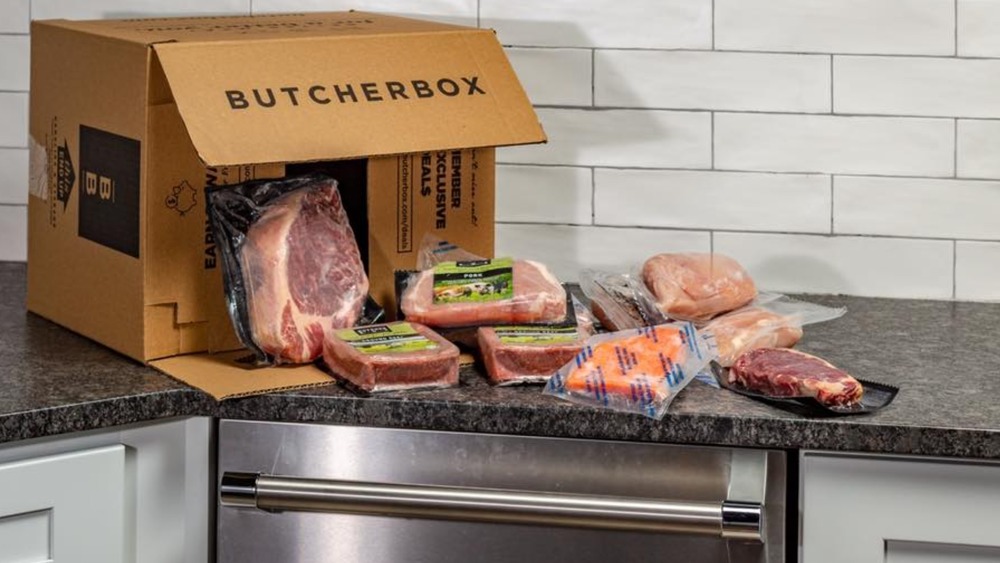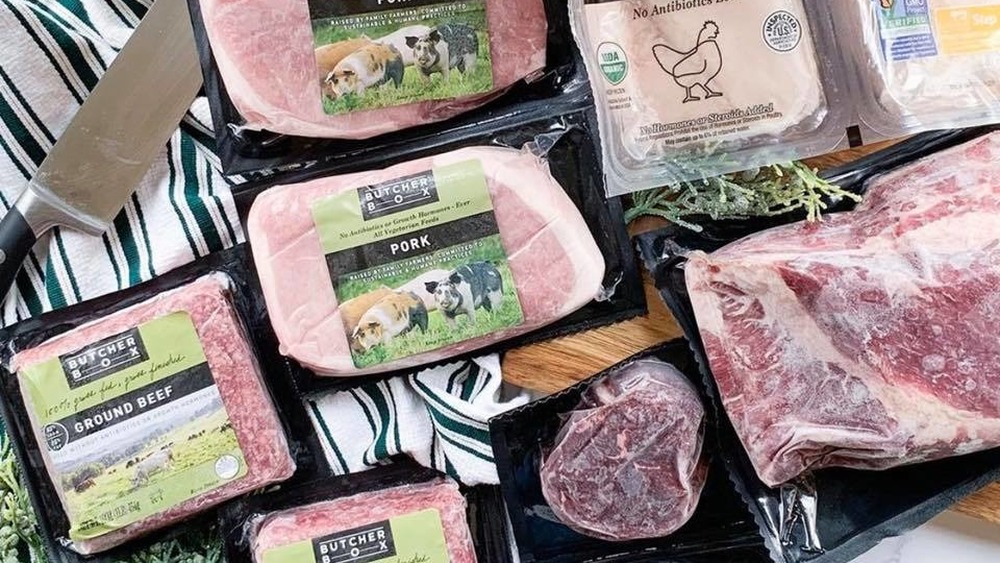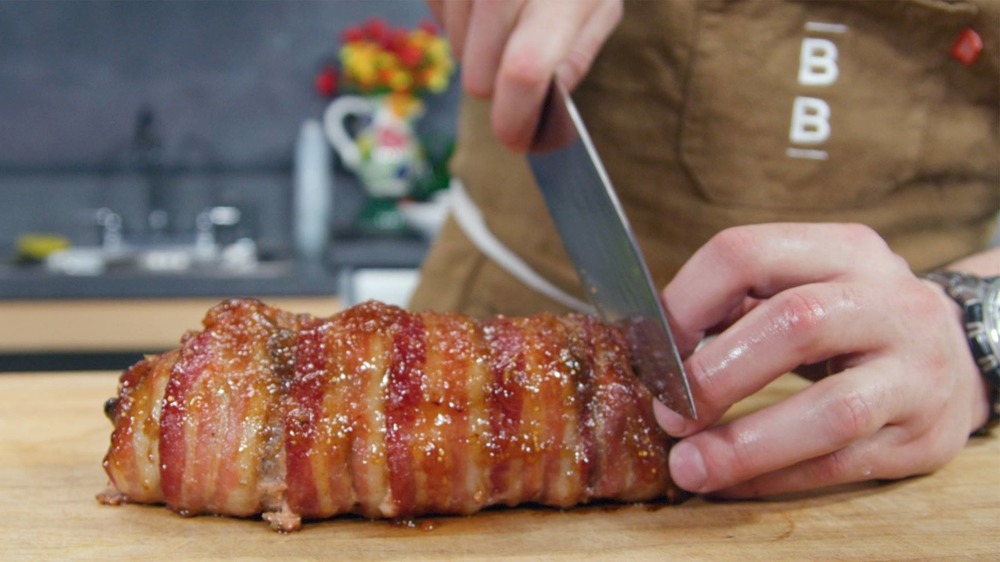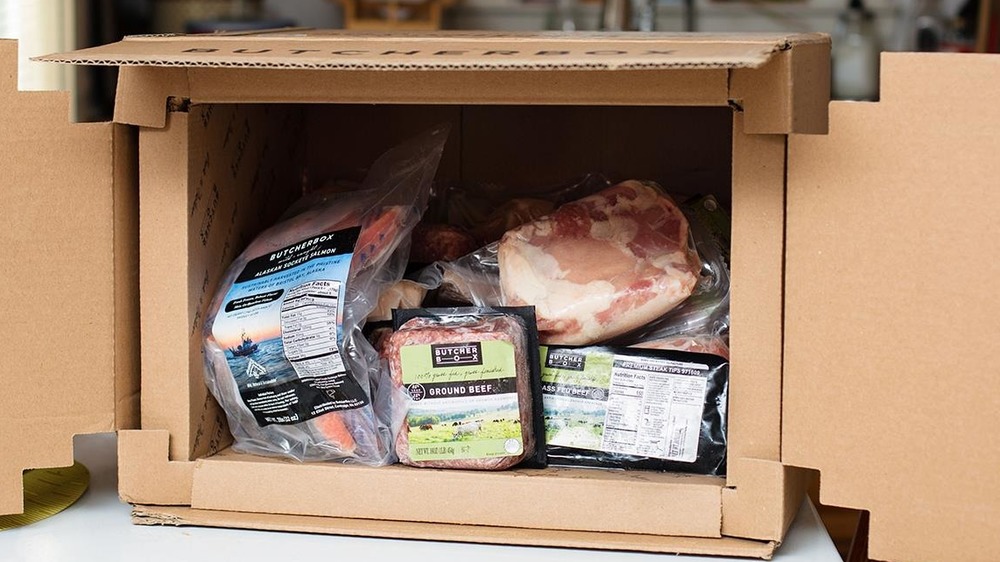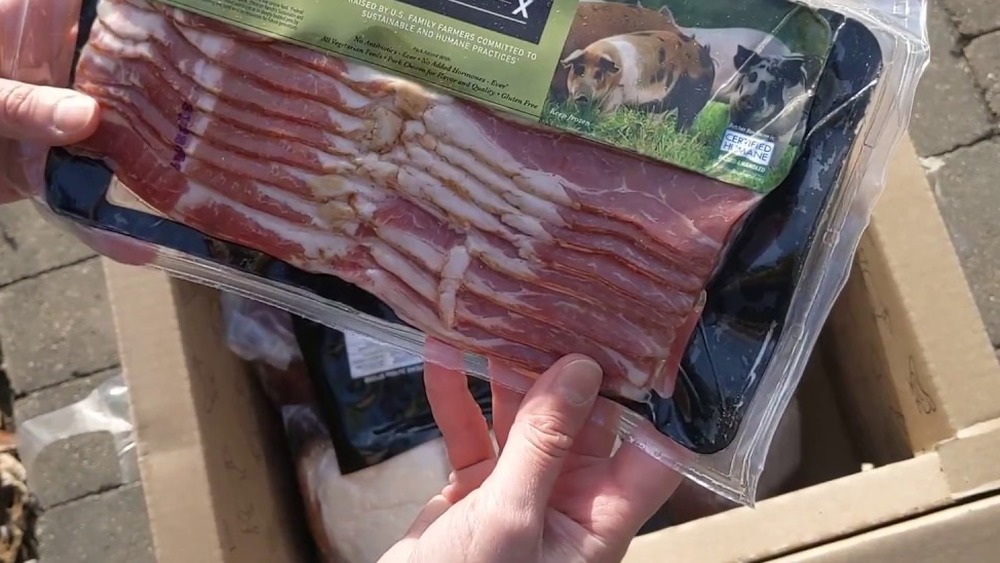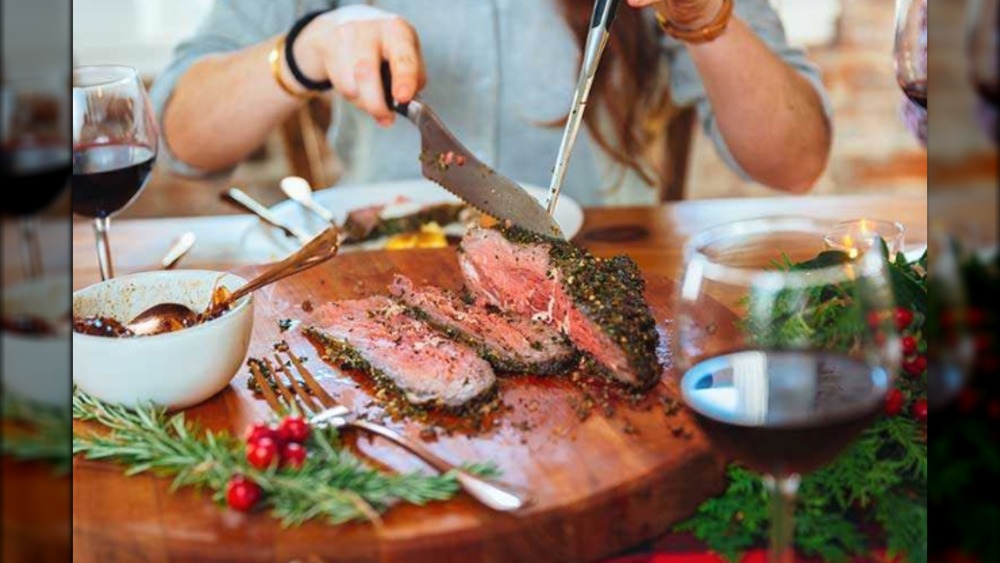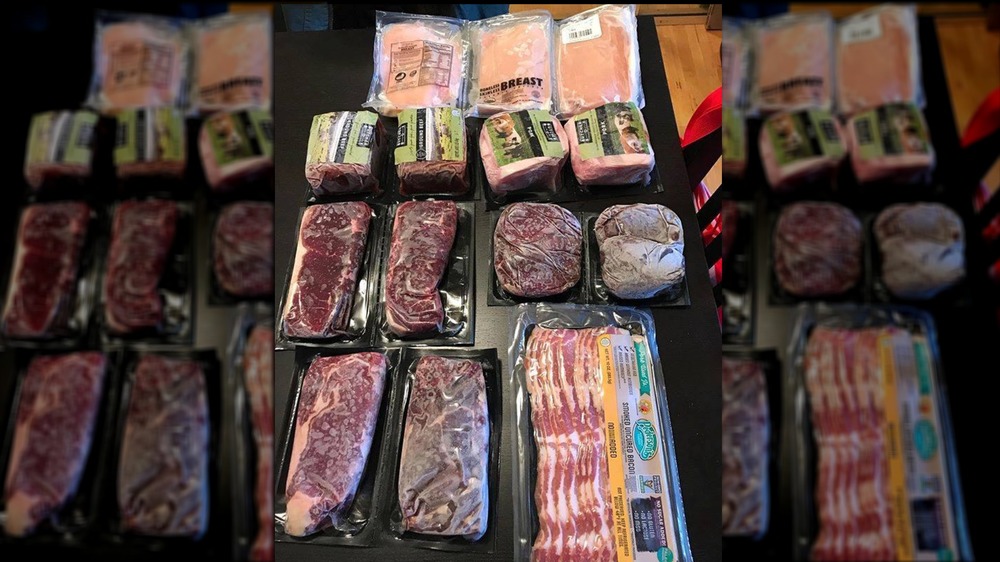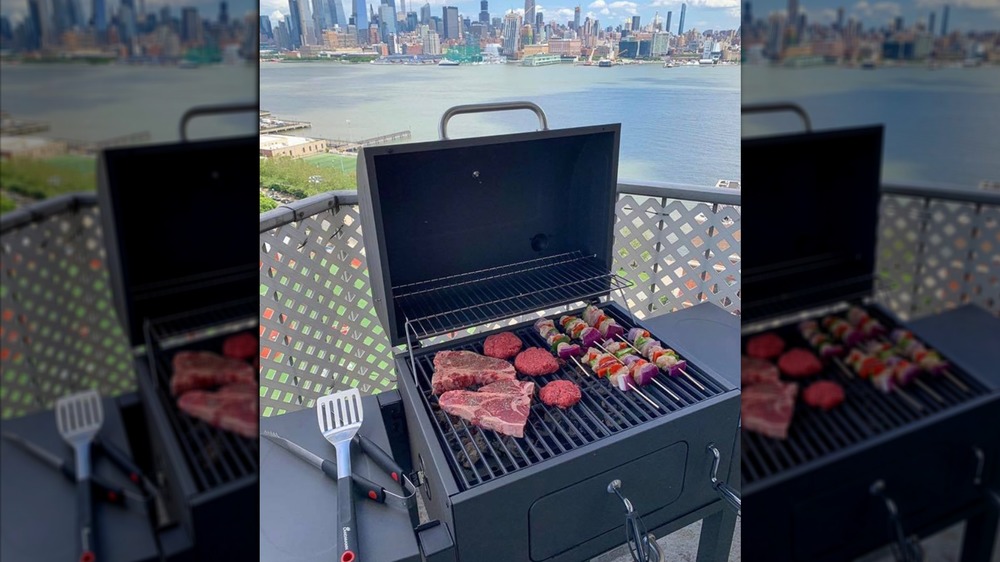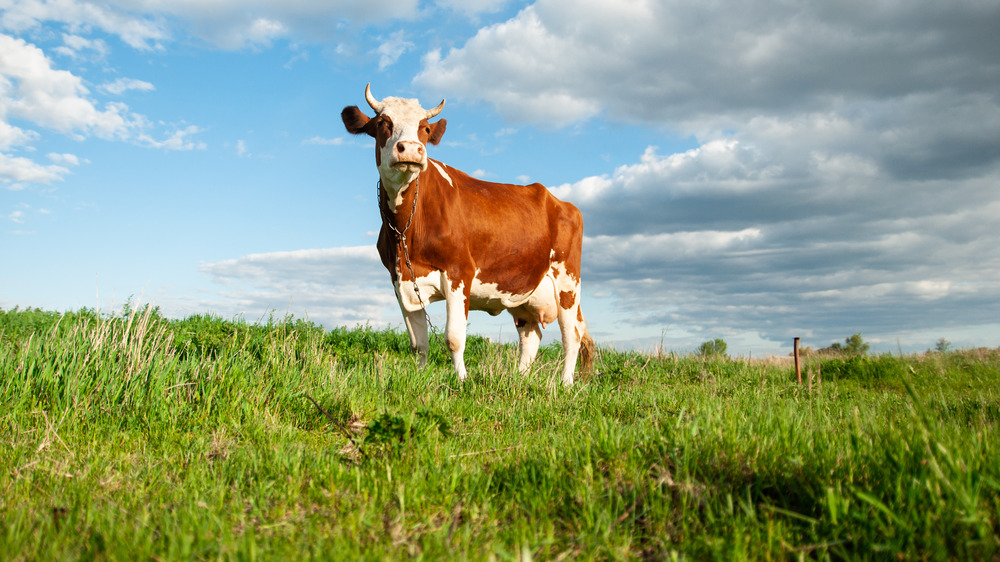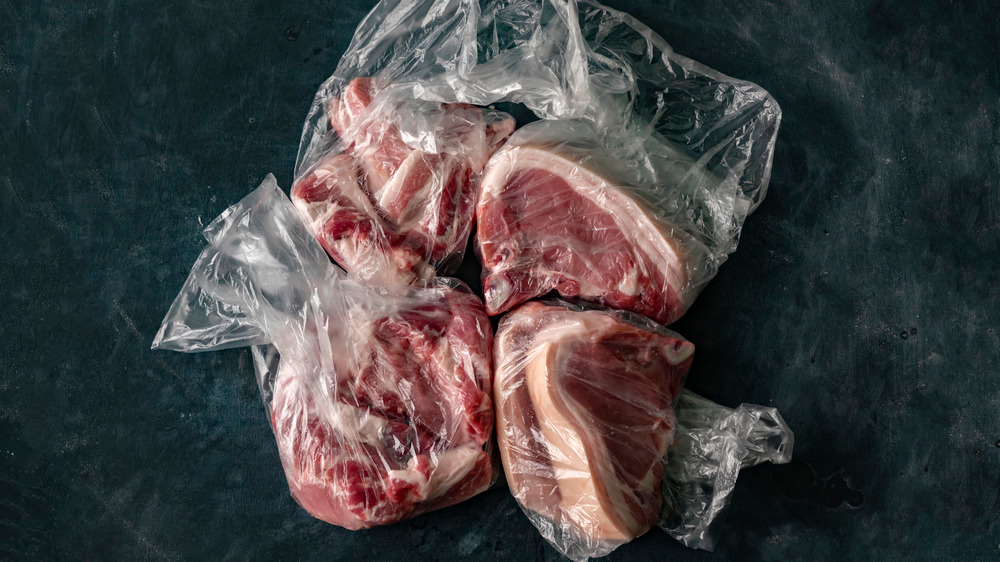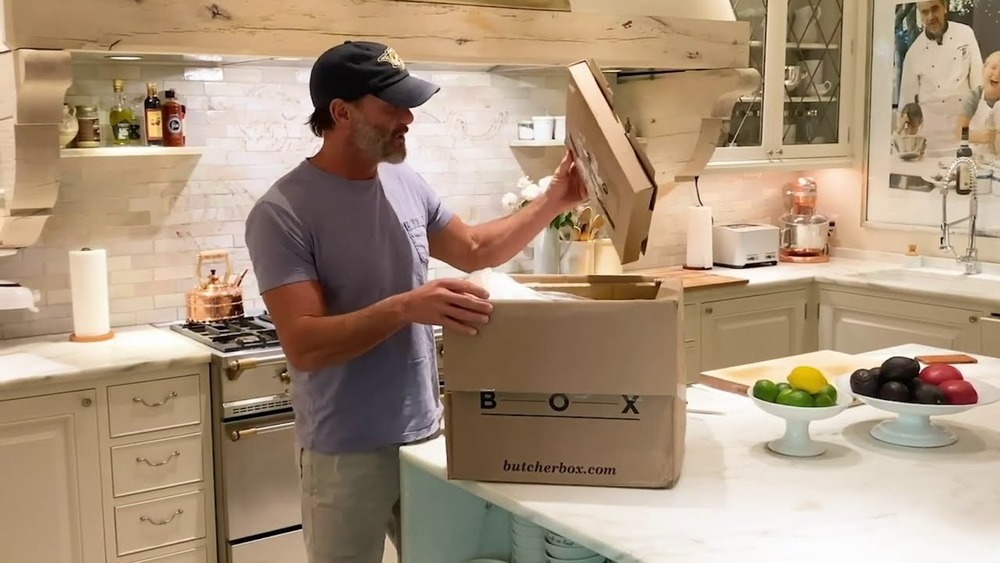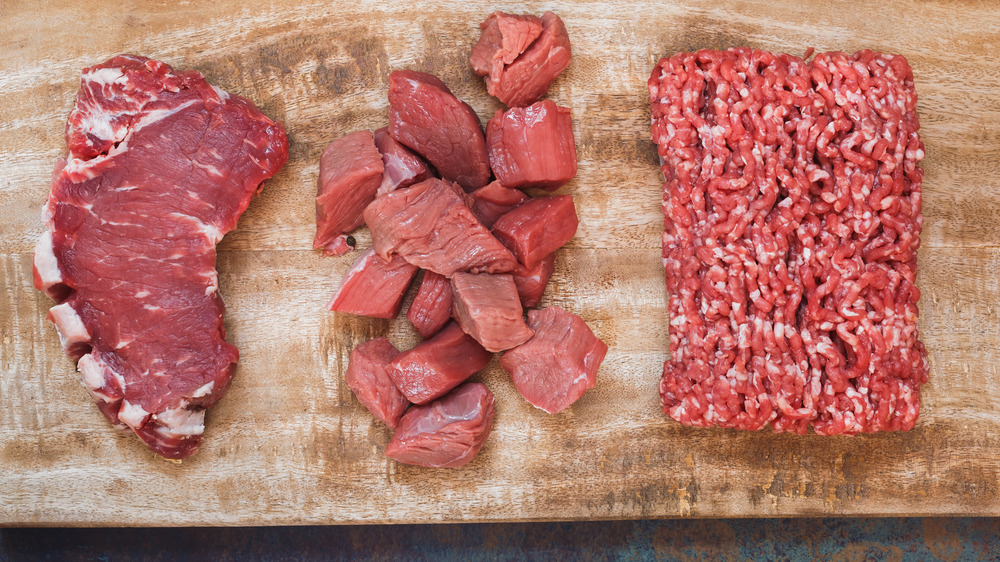The Untold Truth Of ButcherBox
Imagine this: You're sitting at home, comfortably resting on your couch while watching your favorite show, when you hear the doorbell ring. You get up to look outside, and then you see that a fresh box of meat for the weeks ahead has arrived. Before you know it, your fridge and freezer are stocked with high-quality cuts of meat, and you barely had to lift a finger. Seems like the future doesn't it? But in reality, the future is now, and it's partly due to ButcherBox.
The meat subscription company launched in 2015, and at first, their concept of meat delivery seemed pretty strange. How exactly would meat being shipped to your house from states away even work, after all? As it turns out, ButcherBox made a lot of sense to its customers, and people have been flocking to the service ever since. But the untold truth of ButcherBox is that it might be more than just meat in a box, and the company doesn't seem to be going anywhere anytime soon. Here's some insight on why.
This is why ButcherBox started
If you were wondering how, and why exactly, ButcherBox got started, you're not alone. After all, there are a ton of subscription boxes out there for everything from funny looking produce to to candles to beauty products. But meat through the mail? Pretty random, right?
ButcherBox might sound like a strange concept, but it started with a pretty great idea. The meat industry isn't exactly all that ethical, and the creators of ButcherBox say they wanted to change that. Specifically, the goal of ButcherBox was to "provide access to grass-fed beef," to people across the U.S., according to the company's website.
ButcherBox claims they wanted to provide people all over the country with "meat from farmers raising animals the right way." As many people don't live in areas where there are a ton of local butchers or even options to get grass-fed or other high-quality beef, ButcherBox saw an opportunity to send ethnically-sourced beef to anyone, no matter where they might reside, the company says.
An original ButcherBox employee came with extensive experience
When it first got started, ButcherBox relied on a select group of employees to really kick things off. And with one of their original staff members, they hit the jackpot. Michael Billings was the fifth hire for ButcherBox and was given the title of Chief Procurement Officer. Fortunately for ButcherBox customers, Billings came with a ton of previous experience, and that really helped to make the company what it is.
In an interview with the National Retail Federation, Billings explained that he had worked in the meat department at BJ's Wholesale Club for 25 years and jumpstarted that company's meat department. "At BJ's I was the third employee brought on to build the meat department," Billings told the NRF. "We launched meat in 16 stores in three months while figuring out product selection, meat-cutting specifications, case design and store layout. That was all done from scratch, similar to the startup environment at ButcherBox."
Meat selection can be a tricky process, and it seems ButcherBox relied on experts to prioritize expertise and customer relations over other concerns. According to Billings, "price is nowhere near the top of the list" of the company's concerns.
ButcherBox began with a modest goal
As is the case with any new company, there were likely a lot of nerves when ButcherBox first got started. After all, getting meat in the mail isn't exactly something you would expect people to go bananas for. And the creator of ButcherBox understood that. In fact, when the company first launched, ButcherBox CEO Mike Salguero didn't have the highest of hopes for the product.
In an interview with Beef Central, Salguero explained that his initial goal of the ButcherBox KickStarter was to land just $25,000 in pre-sales. But he soon realized that his idea had "struck a nerve" with consumers when he had well over $200,000 worth of pre-sales in just the first 30 days. Obviously, that's a lot more money than expected, but Salguero's modest goal being met so quickly also showed that people might really care about the origins of their meat and how conveniently they can get that quality, Beef Central reports.
Here's why your ButcherBox probably won't go bad in the mail
Listen, as convenient as it might sound to get all your protein sources mailed directly to you without you ever having to leave the house, it's also a little sketchy in some ways. How does the meat come packaged? Will it go bad? When exactly does it arrive? How much does it cost to ship? Fortunately, ButcherBox addresses all these concerns on their website for the most part.
According to the ButcherBox website, the meat the company sends customers has been frozen "at the peak of freshness" and then vacuum-sealed. Then, when they package the meat to send off, they pack the box with enough dry ice to last all the way to its final destination. And if you're worried about not being there when your shipment arrives, ButcherBox will send you shipping information as soon as it's shipped, so you can stalk that box as much as your heart desires.
Obviously, you need to refrigerate or freeze your meat quickly once you get it, but as long as you keep track of your meat, there might not be much to worry about in regard to freshness at delivery.
ButcherBox marketing can get very personal
It's no big secret that most companies continuously work to make their marketing more relatable toward their customers, and that's why you hear about focus groups and large research studies about what customers want in everything from cookies to their cable company. And ButcherBox is no different — but then again, they also are.
ButcherBox not only collects a ton of data about its customers and shoppers, according to Forbes, but it turns that data into a person, almost. Yes, ButcherBox takes its data and turns it into a customer persona, and they've even given it a name, Pam.
According to the ButcherBox website, Pam has been seriously helpful for the company: "Developing this persona has guided a lot of the marketing decisions we've made recently," they explained. "This also impacts the influencers we want to work with and the companies we want to partner with. If it isn't a person or a company that Pam would approve of, they are not a good match."
You might be able to taste a difference in meat quality with ButcherBox
One of the biggest issues people have with high quality meat is the cost. Understandably, it can be intimidating to see just how expensive a nice cut of steak is, or how much more free-range chicken costs. But at ButcherBox, it seems like the quality might be worth the price, according to reviews. According to one Business Insider report, the meat from ButcherBox was truly next level: "The beef, chicken, and pork I tried from ButcherBox were considerably juicier and more tender than the average cuts I get from the market, and they were all delicious," the reviewer wrote.
Additionally, the reviewer went on to compare it to the difference between gas station sushi, and fresh, gourmet sushi. In short, there might be something to the ButcherBox claim that their quality surpasses that of most meat sold in the U.S. So, even though you might be paying over $100 for a box of meat, you might just get your money's worth, depending on your tastes.
The ButcherBox founder was inspired
With a name like ButcherBox, the purpose of the company and its product is pretty clear: delivering meat. But ButcherBox isn't just about delivering meat, according to the company website; it's about delivering high-quality meat, and that's something that came about in the most organic way possible, pun intended.
On the ButcherBox blog, founder and CEO Mike Salguero explained how meeting a local, grass-fed cattle farmer inspired him: "I loved the quality of the grass-fed, grass-finished meat that had been raised as nature intended," Salguero said. He went on to explain that this was how he got his idea for ButcherBox and how he developed the goal of selling meat that was as close-to-earth as possible.
"Knowing the lifecycle of that animal and knowing where it originated, it was just a better experience to have the option to purchase from someone who was raising cattle in a better manner than most other farmers out there," Salguero added. And so, ButcherBox was born.
ButcherBox meat comes from all over
Though the intent of ButcherBox was to bring grass-fed beef to anyone who wanted it, regardless of where they live, the company obviously expanded before too long. And with that expansion came different kinds of meats other than beef, but with similar quality standards, the company claims.
Per the ButcherBox website, their "pasture-raised, 100% grass-fed and grass-finished beef comes from Australia," because Australian cattle can graze all over and stay outdoors all year long thanks to nice weather. But not all the meat from ButcherBox comes from overseas. The pork and chicken comes from either the U.S. or Canada, and the rest of their inventory — including turkey, lamb, and salmon — all come from the U.S. So, when you shop ButcherBox, your meat could have arrived to your doorstep from literally all over the globe, despite that you didn't have to leave home to get it.
ButcherBox has really grown
After ButcherBox was founded in 2015, it quickly grew to become an easily recognizable company. And some indication of that took place in January 2021, when ButcherBox became B Corporation certified, which was a pretty big deal for the ever-growing enterprise, according to ButcherBox CEO Mike Salguero.
So what exactly does being a certified B Corporation mean? According to Harvard Business Review, B Corporations are verified as socially and environmentally-conscious by B Lab, a non-profit organization that measures how companies interact with their employees, their community and the environment.
Salguero told PR Newswire, "Being certified as a B Corp signifies the hard work our team has put in over the last five years to be a responsible and sustainable, high-growth company."
Clearly, the company has really grown since it started, and Salguero sees a ton of hope for the future: "While we have areas to improve in, we are now able to use B Corp as a new lens to view our business decisions and make those improvements," he added.
ButcherBox works to be eco-friendly
You might not necessarily think of a meat company as being eco-friendly, but ButcherBox is here to shift that assumption. The company claims to not only prioritize humane animal habitats in for their meat, but they also seem to work to ensure that their packaging is not too tough on the planet.
In a review of ButcherBox, Healthline reported that the company's packaging standards were eco-friendly in that all of its boxing is recyclable. And that's kind of impressive, considering the materials needed to ensure that their meat arrives safely and on time can't be just any materials. According to Healthline, the ButcherBox containers have built-in insulation, as opposed to insulated bags.
As for how that insulation works, in 2018 ButcherBox teamed up with a company that makes insulation packets that can be composted. The insulation, which is inside the BurcherBox boxes, along with dry ice, work together to keep their deliveries cool.
ButcherBox wants to popularize grass-fed beef in the U.S.
Clearly, ButcherBox cares deeply about meat, whether that be its quality or the ethics behind its origins. And as they have yet to find a ton of grass-fed beef in the United States, making that happen remains one of their biggest goals, Michael Billings, Chief of Procurement at the company, says. In an interview with the National Retail Federation, Billings explained that "cattle in Australia can be traced back to the farm they were raised on," which is something he says "doesn't exist" in the U.S.
Furthermore, Billings explained that ButcherBox was ready to change that: "Recently we hired a person whose prime focus is to build our domestic program."
Billings added that since a lot of American farmers had been farming their whole life, it was hard to get them "to completely change the way they've done things," and that "it takes time and trust to implement those changes."
Still, Billings said he remained confident that the U.S. would soon see more and more grass-fed beef options available to them without having to procure meat from far way in Australia.
